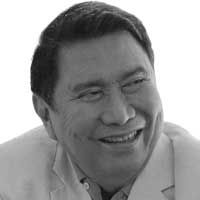Freezing assets

The Anti-Money Laundering Council (AMLC) has frozen the assets of officials and members of the communist National Democratic Front (NDF) and the Abu Sayyaf group (ASG).
The NDF and ASG were recently cited as terrorists by the Anti-Terrorism Council.
The NDF, which reportedly earns hundreds of millions of pesos yearly extorting from mining companies and other businesses that have stakes in areas controlled by the NDF’s New People’s Army (NPA) and from communist-front organizations, probably deposits its money in banks.
But how could AMLC freeze the assets of the Abu Sayyaf when Filipino Muslims don’t believe in the banking system and keep their money in their homes?
The Filipino Muslims’ penchant for keeping their money in their homes was shown when hundreds of millions of pesos was recovered by the military from abandoned homes in Marawi City during the siege that lasted from May 23 to Oct. 23, 2017.
Only a few million pesos found in an abandoned home was turned over by some Marine operatives to the authorities.
But aside from the exemplary honesty shown by the Marines in the Marawi siege, other recovered amounts of money were never turned over.
Some soldiers, who took part in the five-month fighting, said recovered money and illegal drugs were turned over to superiors but were never mentioned again.
All that I’ve said here is to reiterate that Pinoy Muslims keep their money in their homes instead of depositing it in banks.
Here’s another story about the Muslims’ distrust of the banking system: When soldiers raided the houses of the Ampatuan family in Maguindanao, they found hundreds of millions of pesos.
The raids were conducted to confiscate the guns in the arsenal of the Ampatuans, who led the merciless killing of 58 people in what is now dubbed the “Maguindanao Massacre” on Nov. 23, 2009.
A soldier who took part in the raid of one of the houses of the Ampatuans said the raiders found P800,000 inside a vault that once belonged to a bank that went bankrupt.
More money – but of lesser amounts – was recovered and confiscated from other houses of the erstwhile political kingpins of Maguindanao.
The bulk of the money was not turned over. This was probably the reason why, at that time, the commanding general of the Eastern Mindanao Command (EastMinCom), which has jurisdiction over Maguindanao, was not promoted to Armed Forces chief of staff.
That’s also probably the reason why some generals and colonels were able to build palatial homes and deposit millions in banks after the Marawi siege and the raids of the homes of the Ampatuans.
If the AMLC is serious in freezing the laundered money of terrorists, it should also look into freezing the ill-gotten wealth of police and military generals.
* * *
Our corrupt system seeps into every nook and cranny in the government and the private sector.
Even among the many military and police officers who graduated from the Philippine Military Academy (PMA), which imposes the strict honor code of honesty and integrity among its cadets, there are those who have been corrupted by the system.
At the PMA, cadets are dismissed for violating the honor code.
For example, a cadet who witnesses a fellow cadet cheating in an exam and does not report him or her will be kicked out along with the cheater.
But the cadet’s honor code is only good within the confines of Fort Del Pilar, headquarters of the PMA. When a cadet graduates and gets into the real world, chances are he or she will be swallowed up by the corrupt system.
Graduates of Ivy League schools, like the Ateneo, La Salle and the University of the Philippines, where honesty and ethics are also taught, are also more likely to go with the flow, so to speak, in the outside world.
* * *
What do we do to get rid of the rotten system? Let’s try to go the way of the Japanese.
The Japanese imbibe honesty early. They’re taught honesty in their homes and in kindergarten.
That’s why here in the Philippines, you can’t preach honesty to high school and college students. They’ve been too conditioned by the corrupt system. You can’t teach old dogs new tricks.
Honesty is part of the Japanese culture. In Japan, a dorobo (thief) is an outcast.
Japanese individuals who have been found or perceived to be dishonest by their peers sometimes go to Aokigahara (The Sea of Trees), also known as the Suicide Forest, to take their own lives.
* * *
I was told by a close friend of a Supreme Court justice that a division in the high tribunal is in a huddle with the committee on justice in the House of Representatives concerning a proposal to decriminalize libel and just make it a civil case.
The Supreme Court division headed by Associate Justice Marvic Leonen ruled that speech (or a written article) “that guards against abuses of those in public office should be encouraged.”
The high tribunal ruling was made to acquit journalist Raffy Tulfo of libel charges.
Raffy, a former columnist of Abante Tonight, was convicted of libel by a Pasay City Regional Trial Court for exposing irregularities committed by a customs official.
The conviction was affirmed by the Court of Appeals, prompting Raffy to go to the Supreme Court.
“The need to protect freedom of speech and of the press cannot be understated. Without a vigilant press, the government’s mistakes would go unnoticed, their abuses unexposed and their wrongdoings uncorrected,” the ruling said.
Needless to say, the latest ruling by the high court on libel has become jurisprudence, a reference for future or current libel cases against journalists.
- Latest
- Trending
























